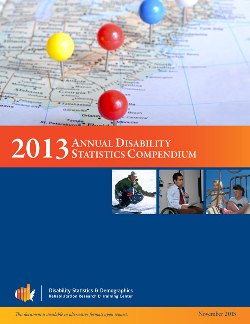Institute on Disability (NH UCEDD) Releases Annual Disability Statistics Compendium
February 26, 2014

|
The Institute on Disability (IOD) at the University of New Hampshire's Rehabilitation Research and Training Center on Disability Statistics and Demographics (StatsRRTC) released its Annual Disability Statistics Compendium at event in Washington, DC.
The Annual Disability Statistics Compendium is a web-based tool that pools disability statistics published by various federal agencies together in one place. When working on legislative and other matters relating to persons with disabilities, the Compendium makes finding and using disability statistics easier.
"The findings contained in 2013 Compendium on Disability Statistics highlight the work that still needs to be done to improve outcomes of Americans with disabilities," said Andrew Houtenville research director at the Institute on Disability and principal investigator for the StatsRRTC grant. "Despite recent gains from the federal government to the private sector to increase economic opportunities, Americans with disabilities remain unemployed and outside the work force at alarming rates. Business, government, and community organizations must work together to build outcome oriented solutions at the local, state, and national level."
Key findings from the 2013 Compendium include:
- Labor force participation for people with disabilities has been nominally decreasing since 2008. Currently, 20.6 percent of people with disabilities participate in the labor force compared to 69.4 percent of people without disabilities.
- 13.4 percent of people with disabilities are unemployed compared to 7.9 percent of people without disabilities.
- 28.4 percent of people with disabilities with a Bachelor's degree or higher are employed compared to 76.1 percent of people without disabilities.
This project is funded by a grant from the U.S. Department of Education's National Institute for Disability and Rehabilitation Research (NIDRR). Key partners include Mathematica, the Kessler Foundation, the Public Health Institute, InfoUse, the American Association of People with Disabilities (AAPD), Center for Essential Management Services (CEMS), and the Council of State Administrators of Vocational Rehabilitation (CSAVR).
For more information, visit www.disabilitycompendium.org.







